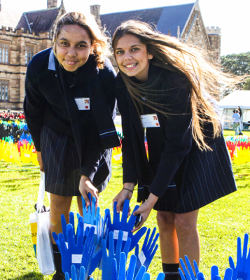Uni shows tertiary path to kids from off the track
 High school students have come together from some of Australia’s most remote regions this week for the Wingara Mura - Bunga Barrabugu Summer Program.
High school students have come together from some of Australia’s most remote regions this week for the Wingara Mura - Bunga Barrabugu Summer Program.
The Wingara Mura (‘a thinking path’) - Bunga Barrabugu (‘to make tomorrow’) Summer Program has brought 250 students to the University of Sydney to get a taste of a broad range of courses and disciplines, as well as receiving guidance on academic life and pathways to higher study.
Currently enrolment levels at tertiary institutions for Aboriginal and Torres Strait Islanders sit at just 1 per cent, but the Federal Government has put pressure on school to increase that figure to 2.2 per cent.
The Wingara Mura- Bunga Barrabugu programs bring in students from the country’s farthest reaches at a critical time in their schooling.
The scheme is aimed at students in year 9, when many are streamed into vocational training rendering them ineligible for an Australian Tertiary Admissions Rating (ATAR).
“We need to do a better job of telling students to keep their options open by aiming for the Higher School Certificate (HSC) and gaining an ATAR,” says Sydney University's Deputy Vice Chancellor (Indigenous Strategy and Services) Professor Shane Houston.
“That's why almost a quarter of the students participating in our program will be in Year 9 this year.”
“Students shouldn't necessarily accept streaming into vocational training in Year 9,” he said.
The Wingara Mura program allows year 9 and 10 students to try their hands at creative art and architectural design challenges, workshops, lectures and laboratory tours for science students, and an introduction to physiotherapy, occupational therapy, speech pathology, and exercise and sports science for budding health students.
The Bunga Barrabugu program has afforded the same opportunities to students in years 11 and 12, with activities modelled on the highly successful Indigenous Australian Engineering Summer School also at the University.
Bunga Barrabugu program runs week-long, while the Wingara Mura section ends on Thursday.
Both are funded by Bridges to Higher Education, a $21.2m initiative by the Commonwealth Government's Higher Education Participation and Partnerships Program (HEPPP) to raise the rates of students coming from communities under-represented in higher education.







 Print
Print